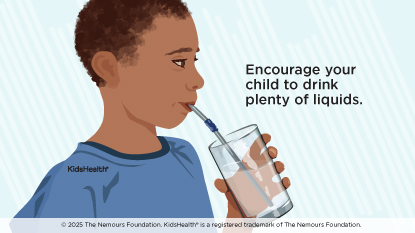When kids vomit (throw up), it is usually caused by a virus (a type of germ) and lasts only a day or two. Your child was given medicine to help stop the vomiting.
You can now care for your child at home. It's important to make sure your child doesn't get dehydrated (not have enough water in the body). To make sure they stay hydrated (get enough liquids), be sure to give plenty of liquids, including an oral electrolyte solution (such as Pedialyte®, Enfalyte®, or a store brand) as recommended by your health care provider. You can buy the oral electrolyte solution at drugstores or supermarkets without a prescription.


Giving Liquids
Starting Food
Medicines

Your child:

Your child:
You know your child best. If your child has symptoms that worry you or seems very sick, call your health care provider or take your child to the ER.

How can we prevent viruses that cause vomiting from spreading? To help prevent the spread of viruses and other germs, teach all family members to wash their hands well and often. They should wash for at least 20 seconds with soap and water. Clean tabletops, doorknobs, and other hard surfaces with a cleanser that kills viruses. Keep your child out of childcare, school, and activities until 24 hours have passed with no vomiting.
Why does vomiting happen in kids? Vomiting in kids is often caused by a virus. The viral infection may also cause diarrhea and fever. Vomiting also can happen from food allergies, food poisoning, certain medicines, gastroesophageal reflux (when liquids from the stomach flow backward up into the mouth), or, very rarely, a blockage in the intestines.
Does my child need an antibiotic? Since viruses are the usual cause of vomiting in kids, an antibiotic won't help your child. Antibiotics treat infections caused by bacteria, not viruses.